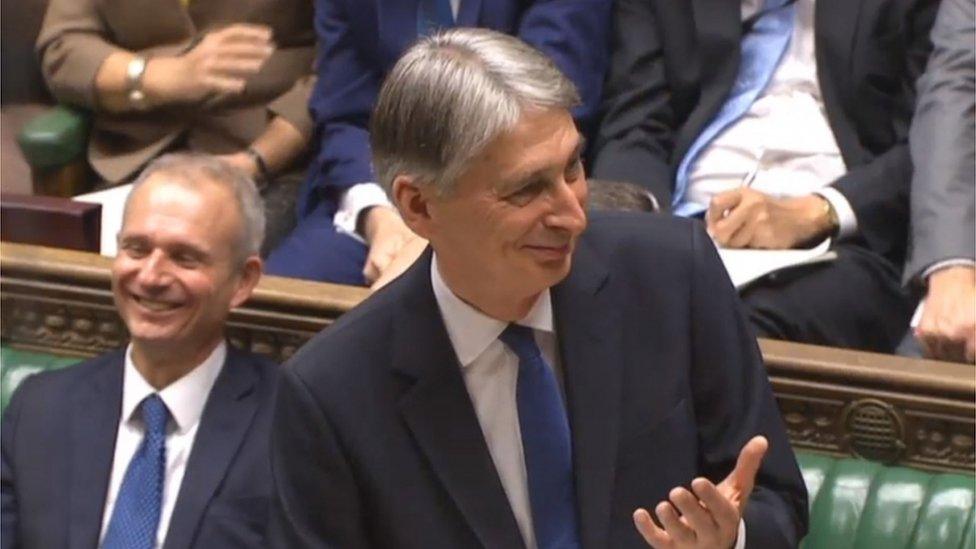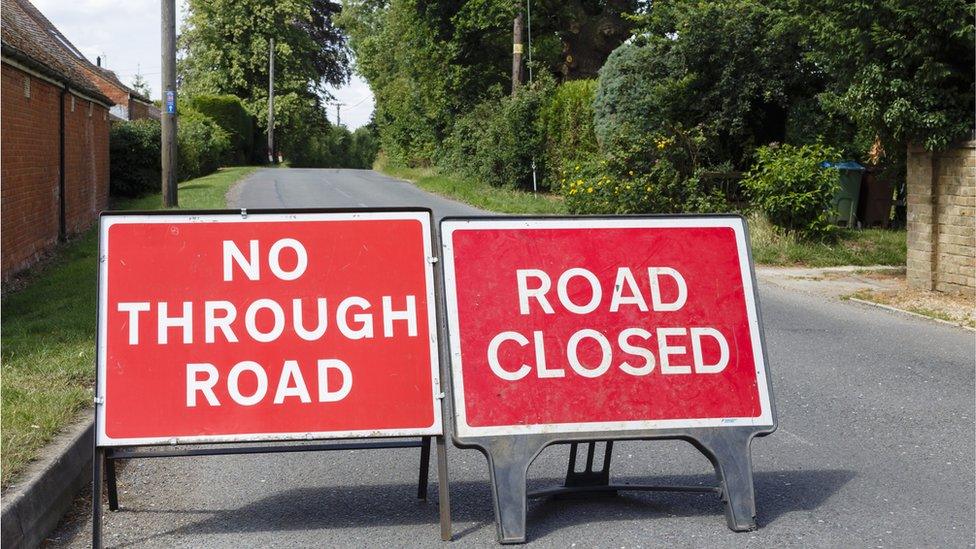The Brexit bill hits the doormat
- Published
The Brexit bill is mounting up
There's billions extra for infrastructure, but will it solve the productivity puzzle?
Oil revenues are forecast to rise again


Before the European Union referendum, then Chancellor George Osborne warned he a "leave" vote would lead to an emergency budget and another round of deep cuts. It turns out that was rubbish.
Instead, he was ousted from office, there was no special budget. His austerity plans have been slightly eased, though in an Autumn Statement more notable for its continuity than any new departures or change of direction.
If anything, it moved the short distance from the austere message that won the Tories the 2015 Westminster election, and close to the fiscal position taken by both the SNP and the Labour Party's shadow Chancellor Ed Balls.
And whatever happened to him? What's that you say? Oh yes, celebrity status for his clunky but entertaining efforts on Strictly Come Dancing.
Enthusiasts for Brexit can point to Mr Osborne's wildly inaccurate forecasts and warnings in the past. But now the independent Office for Budget Responsibility (OBR) has come up with its own estimate for the costs of Brexit.
While the economy slows, it means that there will be a shortfall in growth of 2.4%, when compared with a non-Brexit growth path.
In other words, for every 40 pounds of output the British economy was on course to generate by 2020, it will generate a pound less. Across the country and over time, because that gap recurs year after year, that one pound mounts up to a big bill.
The public finances have also been hard hit. Nearly £59bn of additional borrowing is being directly attributed to the decision to leave the European Union, as growth slows and productivity stalls further for want of a trading stimulus. And that's apart from the £421m estimate of the administrative cost.
Migration
In one of many tables, the OBR helpfully breaks that down. Without the Brexit vote, the public finances were deteriorating anyway. Over the next four years, tax receipts were on course to weaken by about £5bn per year.
The choices made by Phillip Hammond add nearly £3bn to the deficit each year. Without Brexit, continued high levels of migration might have helped boost the economy's growth, which would have given the Exchequer another £6bn by 2020-21.
But with the Brexit vote, it looks rather different. Having lower migration brings higher costs for government, says the OBR, building up to £5.9bn per year by the end of the decade.

Inflation, linked to the weakening of sterling, adds more than £2bn in each of the next four years.
The big growth is in the impact on productivity of changed trade relations, assuming there's less exposure to European competition. What that might mean, in practice, is that a company that is protected behind tariff barriers has less need to drive efficiencies into bidding for contracts.
So while the impact of that on the economy feeds through to a £1.2bn hit to Treasury tax take, that rises to £4.2bn, then £5.5bn, and then £7.2bn in 2020-21.
Maintaining low interest rates has a benefit for the Exchequer, in that it can expect to pay at least £1bn per year less in interest on its debt that it would otherwise have done.
The end result is a rise in the OBR's estimate of the cost of Brexit to Britain's public finances - rising from £3.5bn this year to a peak £15.4bn in 2018-19, before staying close to £15bn for the following two years.
And then? Well, maybe the new trade deals will drive faster growth in the British economy during next decade, and improved productivity to go with it. Or maybe not.
Those who point to past forecasts and George Osborne's scary warnings going badly awry might wish to be careful of making their own predictions for when Brexit begins to turn positive. We just don't know. It's that uncertainty thing, again.
Mind the gap
So what is Phillip Hammond doing about it? If less European trade is going to weaken Britain's productivity position, there's all the more reason for him to join the succession of Chancellors trying to close Britain's productivity gap. Let's hope he has more success than the others.
He illustrated the challenge with the observation that Britain badly trails not only Germany and the USA, but also France and Italy. To a Tory backbencher, that's a call to action.
A German worker can make in four days what it takes a Brit five days to produce, said the Chancellor, and that leaves the Brit earning less and working longer hours. "That has to change."

There's a modest amount of additional funding for roads and rail, for broadband and 5G mobile networks and for research and development.
The idea is that government can provide that platform for connecting up the economy and stimulating the bits where the market isn't delivering the goods - private sector R+D is very low by international standards. On that basis, the challenge is to private sector firms to up their game, including an improvement to the quality of management.
There are a number of problems with that, only one of which is that this extra spending still leaves Britain well short of its international competitors for infrastructure spending, when it already has a lot of catching up to do, on transport for instance.
A more fundamental problem is that Britain's productivity gap is often described as a productivity puzzle. That is, it's not clear why it's so big, and so persistent. And until that's clear, any number of billions of extra spending can be pointed in the wrong direction.
Oil back in the black
Other tables buried within the Treasury and OBR documents spell out some significant changes to assumptions about the future direction of oil and gas revenue.
This is also surrounded by huge uncertainty. Offshore energy revenues have long been the least predictable of the Treasury's sources of income.
By the Budget last March, the OBR was forecasting that low oil prices, low production, low profits and growing allowances would take the tax take into negative territory. That is, the Treasury was on track for the rest of this decade to give away around £1bn per year more in tax breaks than it collects in revenue.
The assumptions behind that have changed. The oil price has remained low, but the guesswork suggests it is going to rise by roughly 10% per year over the next four years. That's in dollar terms. When translated into weaker sterling, the price of oil price looks like rising by closer to 15% per year. Gas prices are assumed to be rising at much the same pace.
With that, profits for the offshore operators look a bit rosier, and the tax take is estimated at £5.8bn over the next four financial years, in contrast with a giveaway of £4bn.
Not so good for the economy or the industry is the added assumption that capital expenditure is on course to fall from £10 billion this year to only £3.7bn by 2021.
Does this make much difference to a government budget of well over £600bn? Not much, these days.
But it does make a difference to those who continue to battle over the future economics prospects of an independent Scotland. Since the collapse in oil revenue, this doesn't solve the challenge for the "Yes" side. But it helps a little.